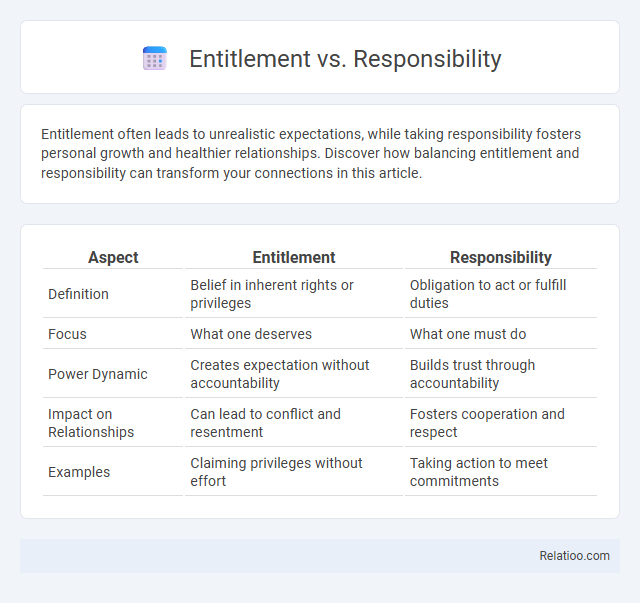Entitlement often leads to unrealistic expectations, while taking responsibility fosters personal growth and healthier relationships. Discover how balancing entitlement and responsibility can transform your connections in this article.
Table of Comparison
| Aspect | Entitlement | Responsibility |
|---|---|---|
| Definition | Belief in inherent rights or privileges | Obligation to act or fulfill duties |
| Focus | What one deserves | What one must do |
| Power Dynamic | Creates expectation without accountability | Builds trust through accountability |
| Impact on Relationships | Can lead to conflict and resentment | Fosters cooperation and respect |
| Examples | Claiming privileges without effort | Taking action to meet commitments |
Understanding Entitlement: Definition and Origins
Entitlement refers to the belief that you inherently deserve certain privileges or benefits without necessarily having earned them, rooted in social, psychological, and cultural factors. Understanding entitlement involves exploring its origins in individual upbringing, societal expectations, and cognitive biases that shape perceptions of fairness and rights. Distinguishing entitlement from responsibility and accountability helps clarify personal roles and the balance between what you expect and what you owe to others.
The Concept of Responsibility: What It Truly Means
Responsibility means being accountable for your actions and decisions, emphasizing ownership and reliability in personal or professional contexts. It involves fulfilling obligations and understanding the impact of your behavior on others, contrasting with entitlement, which assumes rights without earned merit. Embracing responsibility empowers you to build trust, demonstrate integrity, and achieve meaningful success.
Key Differences Between Entitlement and Responsibility
Entitlement refers to a belief that you deserve certain privileges or benefits without necessarily earning them, while responsibility involves being accountable for your actions and fulfilling duties. Key differences include entitlement's focus on personal rights versus responsibility's emphasis on obligations and consequences. Understanding these distinctions helps you balance expectations with accountability in personal and professional contexts.
The Psychological Roots of Entitlement
Entitlement often stems from psychological factors such as upbringing, social environment, and personal experiences that shape one's expectations of receiving without earning. Understanding your sense of entitlement requires recognizing its roots in early reinforcement patterns and emotional needs that can lead to unrealistic demands or passive attitudes. Differentiating entitlement from responsibility involves embracing accountability, which supports personal growth and balanced interpersonal relationships.
Societal Impact of Entitled Attitudes
Entitled attitudes can erode social cohesion by fostering resentment and reducing empathy within communities, leading to increased social fragmentation and conflict. Your sense of entitlement may limit personal accountability, hindering collective efforts to address societal challenges and diminishing trust in institutions. Recognizing the balance between entitlement and responsibility is crucial for promoting social harmony and encouraging proactive civic engagement.
Benefits of Embracing Responsibility
Embracing responsibility enhances personal growth by fostering accountability and self-discipline, which leads to increased trust and respect from others. Your ability to take ownership of actions drives problem-solving skills and empowers you to achieve long-term success. This mindset shift from entitlement to responsibility unlocks opportunities for meaningful contributions and genuine fulfillment.
Entitlement in the Workplace: Challenges and Solutions
Entitlement in the workplace often leads to unrealistic expectations and decreased motivation, causing conflicts and reduced team productivity. You can address entitlement by fostering a culture of accountability and clear communication, ensuring employees understand their roles and the value of their contributions. Implementing performance-based rewards and regular feedback mechanisms helps balance entitlement with responsibility, encouraging professional growth and collaboration.
Cultivating Responsibility in Children and Youth
Cultivating responsibility in children and youth requires shifting focus from entitlement to accountability, emphasizing the development of self-discipline, decision-making skills, and awareness of consequences. Encouraging active participation in household chores, school projects, and community service nurtures a sense of duty and reinforces the importance of contributing to the collective good. Parents and educators play a crucial role by setting clear expectations and providing consistent feedback, fostering an environment where responsibility becomes an intrinsic value rather than an imposed obligation.
Balancing Rights and Duties in Modern Society
Balancing rights and duties in modern society requires nuanced understanding of entitlement, responsibility, and accountability, where entitlement defines individuals' legitimate claims to resources or privileges, responsibility mandates fulfilling obligations towards others, and accountability enforces consequences for actions. This equilibrium ensures social cohesion by preventing the exploitation of entitlements while promoting ethical behavior through responsible acts. Effective governance and cultural norms play critical roles in maintaining this balance, fostering a society where rights are protected and duties are respected.
Strategies for Shifting from Entitlement to Responsibility
Shifting from entitlement to responsibility requires cultivating a mindset centered on personal accountability and proactive problem-solving. You can implement strategies such as setting clear goals, embracing challenges as growth opportunities, and fostering empathy to understand others' perspectives. Developing habits like self-reflection and prioritizing consistent effort helps transform entitlement into a responsible approach toward achieving success.

Infographic: Entitlement vs Responsibility
 relatioo.com
relatioo.com